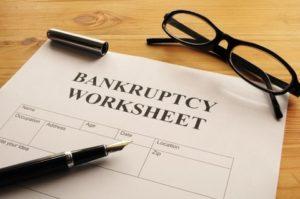 There are several chapters in the bankruptcy code. Chapters 7, 11, 12, and 13 are the most common. There’s also a Chapter 15, but this bankruptcy chapter mainly involves insolvency cases in foreign countries. Chapter 12 is particularly for family farmers and family fishermen to file for bankruptcy protection. Chapter 11, on the other hand, is usually for businesses that want to get out of debt by filing corporate bankruptcy but may also be used by consumers in certain situations.
There are several chapters in the bankruptcy code. Chapters 7, 11, 12, and 13 are the most common. There’s also a Chapter 15, but this bankruptcy chapter mainly involves insolvency cases in foreign countries. Chapter 12 is particularly for family farmers and family fishermen to file for bankruptcy protection. Chapter 11, on the other hand, is usually for businesses that want to get out of debt by filing corporate bankruptcy but may also be used by consumers in certain situations.
When it comes to consumer bankruptcy, however, in Portland, Oregon, Chapters 7 and 13 are the types of bankruptcy that most people turn to for debt relief.
Chapter 7
Also referred to as “liquidation bankruptcy” or “straight bankruptcy,” Chapter 7 bankruptcy filings involve a legal process that may help you wipe out your debts. Individuals, families, or businesses going through financial distress are eligible to file bankruptcy under Chapter 7. If you’re struggling with credit card debt, medical bills, or remaining balances on repossessed cars, they may be included in a bankruptcy discharge in a Chapter 7 bankruptcy process.
Chapter 7 bankruptcy proceedings typically take around 90 days to complete. Take note, however, that not all debts are dischargeable. Certain debts that are not included in a debt discharge are child support, student loan, restitution fees, court fines, and traffic tickets. There are taxes that are not dischargeable, but in some Chapter 7 bankruptcy cases, back taxes may be discharged.
Chapter 13
If you file for bankruptcy under Chapter 13, you will be allowed debt reorganization in a duration of three to five years. The bankruptcy court will order a reorganization plan as per the bankruptcy petition. The bankruptcy judge will assign a trustee.
What happens during the period of bankruptcy is that the debtor makes monthly payments to the bankruptcy trustee, who is protecting the debtor with the automatic stay, preventing creditor collection or possible property seizure. In the course of bankruptcy protection, the trustee then distributes the collected funds to the various creditors the debtor owes. This payment plan is often used to lower a car loan amount or interest and to stop garnishment of child support or tax.
Dealing with Your Creditor
If you have debts that you are unable to pay, you may be dealing with creditors or debt collectors reminding you to pay back what you owe. Many banks and credit card companies choose to use collection agencies to hound their debtors.
Despite your failing, keep in mind that bill collectors are required to treat you with fairness, truth, respect, and dignity. There is a federal law, the Fair Debt Collection Practices Act (FDCPA), that mandates collectors to behave accordingly when dealing with debtors.
Protection from Collector Harassment
There are measures that collectors aren’t allowed to take in order to pressure you into making debt payments. Here are some acts that would qualify as harassment:
- Persisting with calling you at work despite having been previously informed that it’s an inconvenient time or that your boss doesn’t allow it.
- Communicating with your family, neighbors, employer, or colleagues about your debts.
- Threatening wage garnishment or legal action unless the collector is a law attorney licensed to practice in Oregon.
- Getting you fired from your employment.
- Embarrassing or humiliating you in any way.
As a consumer, you are protected from debt collection harassment according to state and federal laws. If you have received such treatment from a creditor or collector, consult a lawyer right away. Violation of the FDCPA and other statutes of consumer protection is a serious matter. This is why it’s important to document and record every communication you receive from a debt collector. Many who cannot pay off their debts on time tend to throw out messages from collectors as a reflex of denial. This is an unwise move in more ways than one.
Take note that creditors also have rights that must be protected. If you plan to pay your debt, you can find a suitable solution. Seek out an expert on bankruptcy law to get bankruptcy information and advice on the best path to take.
Bankruptcy Attorneys in Portland Oregon
Bankruptcies do not have to be the death sentence that the accompanying stigma suggests. For many, filing personal bankruptcy in Portland has, given them the fresh start that they wished for, the debt management opportunity that they wanted, or the lesson in financial management that they needed. A session with a Portland bankruptcy attorney can be very eye-opening. Life can actually be better after bankruptcy.
If you ever find yourself in a situation where your financial problems are serious enough to bankrupt you, consult a bankruptcy attorney right away. If you’re facing foreclosure or repossession, bankruptcy lawyers can help you deal with your situation with the best solution that the bankruptcy act provides. Call us at Northwest Debt Relief Law firm to talk to an excellent and experienced Portland bankruptcy lawyer.











